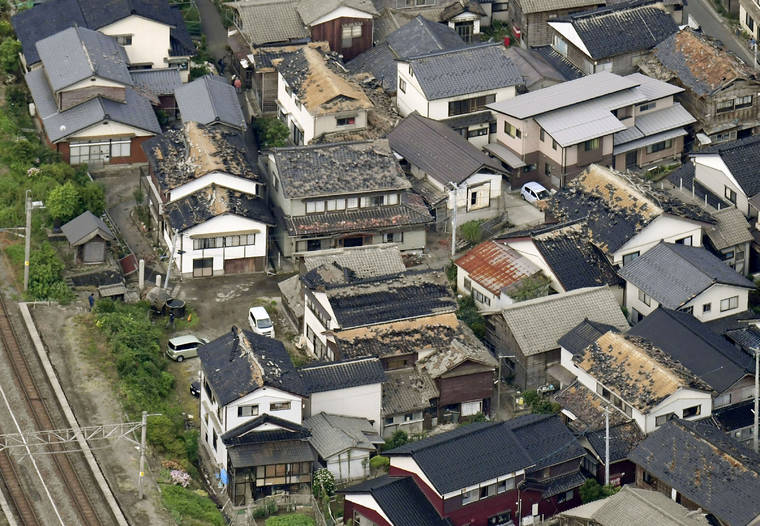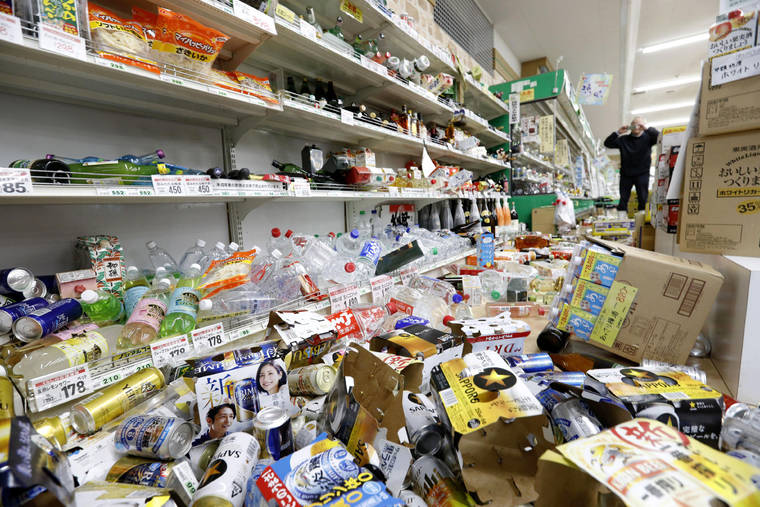TOKYO — A powerful earthquake jolted northwestern Japan late Tuesday, causing minor injuries to 21 people and a brief evacuation of coastal homes until the risk of a tsunami passed.
Store floors were littered with goods that fell off shelves, and roofs of homes showed bare spots where tiles had shaken loose. But business was returning to normal Wednesday morning, with trains mostly running as usual and electricity restored to thousands of homes that lost power temporarily.
There were no reports of serious damage from the magnitude 6.7 quake. Minor sea level changes were detected by several coastal cities, but the tsunami warning was lifted after about 2 ½ hours.
Japan’s Meteorological Agency said the earthquake struck off the western coast of Yamagata about 50 kilometers (30 miles) southwest of the city of Sakata. It was fairly shallow, about 14 kilometers (9 miles) below the sea’s surface. Shallow quakes tend to cause more damage.
The Fire and Disaster Management Agency said 21 people were injured, most of them in Yamagata prefecture and that most injuries had minor injuries.
Chief Cabinet Secretary Yoshihide Suga urged residents to be prepared for possible aftershocks.
Tsuruoka city crisis management official Takehiko Takahashi said in a televised interview that city officials helped coastal residents evacuate to higher ground as a precaution before the tsunami warning was lifted.
More than 1,500 people took shelter at evacuation centers in Murakami city and elsewhere in Niigata prefecture, but many of them left Wednesday morning to check their homes. Public broadcaster NHK showed people using flattened cardboard boxes as mattresses to sleep on in a school gym. Many others, including children, were still awake and sitting against the walls.
Bullet train service was suspended in parts of the region because of power outages and for safety checks, but were functioning normally Wednesday morning. About 9,000 households in Yamagata and Niigata lost power, according to Tohoku Electric Power Co.
All seven reactors at the Kashiwazaki-Kariwa nuclear plant in Niigata were offline and no abnormalities were reported. Two other nuclear power plants in the affected region were also intact, according to the Nuclear Regulation Authority.
NHK showed broken glasses and dishes scattered on the floor of a bar in Tsuruoka which was empty after customers rushed out, leaving behind their half-eaten food on the counter.
Japan is one of the most earthquake- and tsunami-prone areas in the world. On March 11, 2011, a magnitude 9.0 quake offshore caused a tsunami that triggered meltdowns at the Fukushima nuclear power plant. The quake and tsunami heavily damaged coastal neighborhoods and took more than 18,000 lives.
———
Follow Mari Yamaguchi on Twitter at https://www.twitter.com/mariyamaguchi




